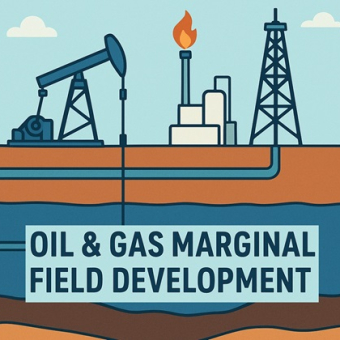- Selamat datang di website PT Fiqry Jaya Manunggal. Semoga anda senantiasa sehat afiat. Kami siap melayani anda
Applied Reservoir Engineering
Rp 14.950.000| Stok | Tersedia |
| Kategori | Oil & Gas |
3 - 6 February 2025, Bandung
13 – 16 May 2025, Bandung
Instructor: Prof. Herianto, Ir, M.Sc., Ph.D
Applied Reservoir Engineering
BACKGROUND:
Petroleum Engineering practically covers: Production Operation, Drilling, and the core (Reservoir Engineering). This training represents the core of the reservoir engineering program. Numerous engineering practices are covered from fluid & rock properties to simulation & field development planning.
As the core, Reservoir Department is the only one that normally cares about the live time & field performance of oil & gas fields. Therefore it is really important to correctly manage our reservoir to produce & operate the field in the most optimum way.
OBJECTIVES:
After attending this training participants should be able to:
- Determine critical properties of reservoir rocks fluid (oil, water & gas), PVT relationship
- Calculate hydrocarbon initially in place
- Assess reservoir performance
- Determine parameters impact well/reservoir performance over time
- Analyze well test using standard well-testing principles & techniques
- Characteristics of aquifer
- Determine reservoir drive mechanism for both oil & gas
- Apply oil & gas field development planning principle
- Forecast production decline
Recommended Participants
Engineers or geoscientists who will occupy the position of reservoir engineer, and any other technically trained individuals (completion, work-over, production, drilling, well-services) who desires a more in-depth foundation in reservoir engineering.
Course Outline
- Asset life cycle, professional roles, hydrocarbon reservoir descriptions
- Porosity, permeability, compressibility, capillarity pressure, wet-ability & relative permeability, averaging reservoir property data
- Phase behavior of reservoir fluids, gas properties, oil properties, water properties, PVT sampling, & understanding PVT laboratory reports
- Calculate original hydrocarbon in-place with volumetric methods, build hydrocarbon volume Vs depth relationship & review reserve booking guideline
- Oil recovery material balance, gas material balance, volumetric compaction, water drive
- Oil-well testing: radial flow theory, wellbore storage & skin, draw-down, buildups, curve-shapes, type-curve solution, pseudo steady state, steady state, average pressure estimate, PI & IPR relationships
- Gas-well testing: pressure, pressure-square, real pseudo pressure solutions, rate sensitive skins, multi-rate testing, gas well deliverability
- Imicible displacement: fluid displacement process, fractional flow
- Description of coning, cusping & over/under running, critical rate calculations, breakthrough times, horizontal well applications
- Gas reservoirs: volumetric, water drive & compaction drive-oil reservoirs: water drive, water flood, gravity drainage, gas cap expansion, combination drive, naturally fractured & critical reservoir fluid properties
- Gas field developments: characteristics, deliverability issues, sales-contracts
- Oil field development: development phases, reservoir characterization, sweep & recovery, production policies
- Reservoir simulation: why simulate? Various simulation models, simulator types, setting up a simulator model
About The Course Leader
Prof. Herianto, Ir, M.Sc., Ph.D
Applied Reservoir Engineering

Monobore Drilling and Completion
BACKGROUND: Monobore Drilling & Completion diangap suatu terobosan baru yang akan lebih ekonomis dan membutuhkan waktu yang lebih cepat jika diterapkan. Dengan semakin menipisnya cadangan minyak dan gas, maka reservoir minyak dan gas yang marginal dengan type reservoir yang berlapis akan tidak ekonomis lagi jika di bor dan di komplesi dengan cara konvensional. Agar kegiatan…
Rp 14.950.000
Integrated Production Optimization
Background & Objectives: A production system is the system that transports reservoir fluid from the subsurface to the surface and separates it into oil, gas, and water. From there the oil and gas streams are treated if necessary and prepared for sale or transport from the field. Any water produced will also treated and prepared…
Rp 8.950.000
Surface Wellhead System
Background The surface wellhead system plays critical role ensuring safe & efficient control of hydrocarbons from the reservoir to processing facilities. Positioned on surface, wellhead serves as the primary interface between subsurface operations & topside facilities. It provides structural and pressure control throughout the well’s life cycle. Among its key components, the Christmas tree enables…
Rp 6.350.000
Reservoir Simulation
BACKGROUND Production and operation teams cannot directly observe how conditions change within a reservoir during production. Instead, they depend on sophisticated simulation models that transform subsurface. Therefore, reservoir simulation serves as a cornerstone for understanding reservoir performance and optimizing recovery strategies. Integrating geoscience, production data, engineers can forecast future performance under various scenarios, identify operational…
Rp 9.950.000
Taxation, Legal and Financial Aspects of PSC
BACKGROUND: Taxation, Legal, and Financial Aspects of Production Sharing Contracts (PSC) focuses on equipping participants with a comprehensive understanding of the complex tax regulations and legal frameworks governing PSCs in Indonesia. As one of the primary models for oil and gas exploration and production, PSCs involve intricate financial structures, cost recovery mechanisms, and tax obligations…
Rp 14.500.000
Marginal Fields Development
Background: Marginal fields development refers to discoveries which have not been exploited for long, due to one or more of the following factors: • Very small sizes of reserves/pool to the extent of not being economically viable • Lack of infrastructure in the vicinity and profitable consumers • Prohibitive development costs, fiscal levies and or…
*Harga Hubungi CS
